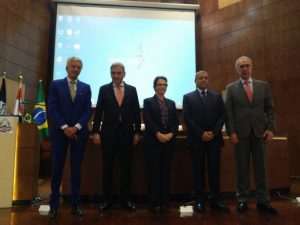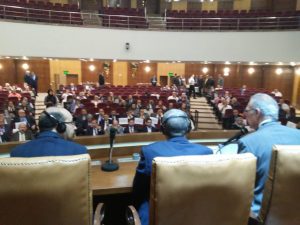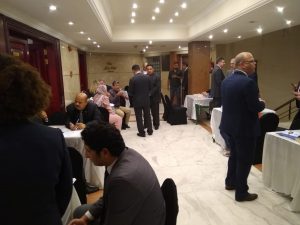(MENAFN- Brazil-Arab News Agency (ANBA)) Gabriel Kawamura Pomerancblum
Cairo – Arab Brazilian Chamber of Commerce president Rubens Hannun announced this Sunday (15) an initiative to establish new nonstop shipping lanes between Brazil and Arab countries. He spoke during the Brazil-Egypt Business Seminar in Cairo, during Brazil's Agriculture, Livestock and Supply minister Tereza Cristina's tour of Egypt. The seminar was attended by Brazilian and Egyptian businesspersons at the Federation of Egyptian Chambers of Commerce headquarters..

Minister Cristina (C) and Hannun (R) at seminar in Cairo
Hannun said that in a meeting with Arab countries' Economy ministers earlier this month, the Arab League's Economic and Social Council decided it will work to develop Arab-Brazilian nonstop shipping routes. The goal is to foster the creation of corporate entities with joint private sector investment involving Arab countries and Brazil. This will be done in partnership with the Arab Brazilian Chamber of Commerce and the General Union of Chambers of Commerce, Industry and Agriculture for Arab Countries – the commerce-oriented arm of the Arab League. The Chamber and the Union had both been pushing for this initiative.
Speaking with ANBA after the seminar, the Chamber's president said he believes the routes will help drive down product costs. At this time, nonstop Brazil-Egypt shipping is available only for a specific goods. Ships departing from Brazil will travel to other areas before getting to the Arab world. 'With a nonstop shipping lane, you save time and enable cheaper costs. There's synergy so that ships won't be empty for the return trip. Once this is in place, freight and product costs drop,' says Hannun.
He also discussed another measure to make exports from Brazil to Arab countries cheaper and faster: implementation of the Arab Chamber's online document certification. 'We are working on it, on it. Online certification cuts costs by 20% and reduces lead times from 20 to five days,' he told ANBA. Tests are already underway in trade with Jordan. 'This ultimately means more affordable products for people,' argued Hannun.

Businesspersons were in attendance
In her address, minister Tereza Cristina went over the Brazil-Egypt trade partnership and said the countries must keep working to minimize any barriers. She stressed the need to diversify trade – a key point of her tour of Arab countries. Apart from Egypt, she will travel to Saudi Arabia, Kuwait and the UAE.
She pointed out that Egypt is the eleventh biggest importer of agricultural products, and that the industry accounted for 67% of the USD 2.1 billion in goods shipped from Brazil to Egypt. 'But variety is still lacking,' she said, noting that beef, maize and sugar make up 75% of total sales. 'There's a lot of room for growth and diversification,' she said. She also said Brazil is a major player in coffee and fruit juices, none of which are relevant in trade with Egypt.
The superintendent for International Relations with the Brazilian Agriculture and Livestock Confederation of (CNA), Lígia Dutra also said agribusiness exports from Brazil lack variety. She said Brazil could supply more dairy, fruits, flowers and plants, fish, honey products and coffee to Egypt. Lígia argued that Brazil's sales to Egypt are highly dependent on animal protein, and said Brazil can step up production to export more product.

Business meetings at the Federation headquarters
In turn, the director-general for International Affairs with Egypt's Ministry of Trade and Industry, Michael Gamal Kaddes, discussed the free trade agreement that the Mercosur sustains with Egypt, and said that Egypt's exports to the bloc consist of manufactured goods. 'To this day, Egypt has not been able to export its agricultural products to the Mercosur,' he said. Brazil is Egypt's premier trading partner in the bloc.
Keynote speaker Ibrahim El Araby, who presides over the Federation of Egyptian Chambers of Commerce, stressed Brazil's relevance as a supplier of food products to his country. According to him, 11% of the food consumed in Egypt comes from Brazil. Still, he believes current trade falls short of its potential. He said he'd like to see more Brazilian investment in Egypt. According to Araby, Brazilian investors are already present in Egypt's cement, bus and agribusiness industries.
Speakers at the seminar also included Brazilian Animal Protein Association (ABPA) CEO Ricardo Santin, Egyptian Frozen Food Importers Association vice president Sherif Ashouf, and Federation of Egyptian Chambers of Commerce secretary-general Alaa Ezz. Brazil's ambassador to Egypt, Ruy Amaral, sat in the panel. Brazilian and Egyptian businesspersons met after the addresses. The activities at the Federation were organized by the Arab Brazilian Chamber as part of the Brazilian minister's mission.
Translated by Gabriel Pomerancblum
MENAFN1509201902130000ID1099007524
Legal Disclaimer:
MENAFN provides the information “as is” without warranty of any kind. We do not accept any responsibility or liability for the accuracy, content, images, videos, licenses, completeness, legality, or reliability of the information contained in this article. If you have any complaints or copyright issues related to this article, kindly contact the provider above.